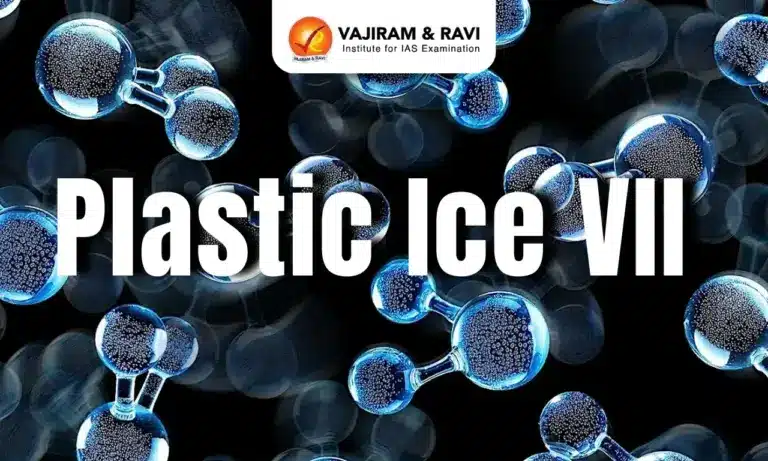Plastic Ice VII Latest News
For the first time in scientific history, researchers have directly observed a strange phase of water known as Plastic Ice VII, which is believed to exist deep within the interiors of icy planets and moons, such as Neptune, Europa, and Titan.
What is Plastic Ice VII?
- Plastic Ice VII is a hybrid phase of water that displays the dual characteristics of both a solid and a liquid:
- Like a crystalline solid, the water molecules remain in fixed positions within a cubic crystal lattice.
- Simultaneously, these molecules can rotate freely, similar to the behavior of molecules in a liquid.
- This unique plasticity means the ice can deform under pressure like a malleable substance, making it fundamentally different from conventional ice types found on Earth.
Why is it called “Plastic” Ice?
- The term “plastic” refers not to synthetic materials but to its physical property of plasticity—the ability to mold or deform under pressure while still maintaining a solid structure.
- Physicist Livia Bove, one of the lead researchers, describes it as a solid that can be squeezed through a hole, highlighting its semi-fluid behavior under stress.
The Discovery and Methodology
- This breakthrough was achieved by scientists at the Institut Laue-Langevin in Grenoble, France, using a cutting-edge neutron beam tool capable of analyzing molecular behavior at extreme pressures and temperatures:
- The experiments involved heating water to 326°C and subjecting it to pressures of up to 60,000 bars, equivalent to 28 times the pressure at the Mariana Trench, Earth’s deepest ocean point.
- Under these conditions, water molecules exhibited rapid rotational motion while staying in place structurally—confirming the formation of Plastic Ice VII.
- By analyzing the energy shifts of scattered neutrons, the team could accurately track molecular movements, proving the presence of this exotic state of matter.
Comparison with Other Ice Phases
- Common Earth Ice (Ice Ih): Found in glaciers, snow, and ice cubes; molecules are arranged in a hexagonal honeycomb lattice.
- Ice VII: Forms above 20,000 bars, has a dense cubic structure, and has been found in diamonds and is theorized to exist inside Earth and other planets.
- Plastic Ice VII: A phase of Ice VII with mobile water molecules, but within a fixed lattice, existing above 30,000 bars and 177°C.
Plastic Ice VII FAQs
Q1. What is Plastic Ice VII?
Ans. Plastic Ice VII is a rare high-pressure form of ice, distinct from regular ice, where water molecules are arranged in a cubic crystalline structure rather than the hexagonal form found in common ice.
Q2. Under what conditions does Ice VII form?
Ans. Ice VII forms under extreme pressure, typically above 2 GigaPascals (GPa), which can occur naturally deep within planetary interiors or in laboratory settings.
Q3. Why is Ice VII scientifically significant?
Ans. Ice VII is important for understanding planetary science because it likely exists in the mantles of icy moons and exoplanets, influencing theories about water and life beyond Earth.
Source: SCN
Last updated on February, 2026
→ UPSC Notification 2026 is now out on the official website at upsconline.nic.in.
→ UPSC IFoS Notification 2026 is now out on the official website at upsconline.nic.in.
→ UPSC Calendar 2026 has been released.
→ UPSC Final Result 2025 is expected to be released in the first week of March 2026.
→ Check out the latest UPSC Syllabus 2026 here.
→ Join Vajiram & Ravi’s Interview Guidance Programme for expert help to crack your final UPSC stage.
→ UPSC Mains Result 2025 is now out.
→ UPSC Prelims 2026 will be conducted on 24th May, 2026 & UPSC Mains 2026 will be conducted on 21st August 2026.
→ The UPSC Selection Process is of 3 stages-Prelims, Mains and Interview.
→ Prepare effectively with Vajiram & Ravi’s UPSC Prelims Test Series 2026 featuring full-length mock tests, detailed solutions, and performance analysis.
→ Enroll in Vajiram & Ravi’s UPSC Mains Test Series 2026 for structured answer writing practice, expert evaluation, and exam-oriented feedback.
→ Join Vajiram & Ravi’s Best UPSC Mentorship Program for personalized guidance, strategy planning, and one-to-one support from experienced mentors.
→ Check UPSC Marksheet 2024 Here.
→ UPSC Toppers List 2024 is released now. Shakti Dubey is UPSC AIR 1 2024 Topper.
→ Also check Best UPSC Coaching in India


















